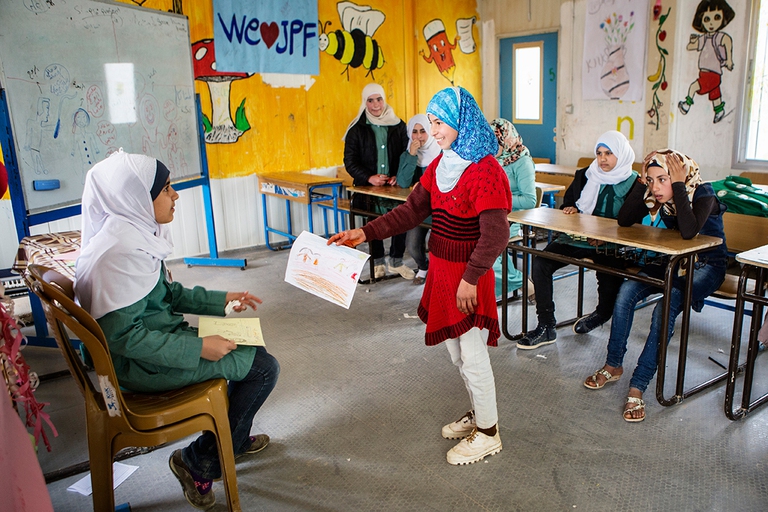
Costa Rica celebrated its first same-sex marriage when two women, Alexandra Quiros and Dunia Araya, celebrated their wedding: an “extraordinary moment”.
A young Syrian rufugee is campaigning against child marriage, encouraging other girls to fight the practice. Here’s her story.
Omaima Hoshan has been living in the Zaatari refugee camp, Jordan, with her family since 2012. One day, her 13-year-old best friend didn’t show up in school because her parents gave her hand in marriage to a cousin. After the marriage, she was never seen again. Since then, Hoshan started hearing about many others girls forced to face the same destiny.
Hoshan confided her sense of inequity to her father. She wanted to do something. Encouraged by him, Hoshan started to talk with her friends, pushing them to address the issue with their own parents. Thanks to the support of NGO committed to ending child marriage, she started to run workshops and awareness raising sessions on the risks linked to child marriage. During her meetings, Omaima Hoshan talks about the social and health consequences of this phenomenon. Child brides have higher risks of maternal mortality and complications during pregnancy due to their physical immaturity. Plus, they’re more likely to drop school, be victims of domestic violence and social exclusion.
18 is the legal age for marriage in Jordan, in accordance with the Convention on the Elimination of all Forms of Discrimination against Women (CEDAW) ratified in 1992. In spite of it, judges can allow child marriage in specific circumstances. Even if “only” 8 per cent of Jordan girls are given in marriage before turning 18 (according to UNICEF), the phenomenon is increasing sharply among Syrian refugee girls who arrive in Jordan, registering a 20 per cent increase since 2011. Such data could be explained with families’ will of improving their economic situation. To parents, giving their daughter’s hand in marriage means relieve the economic burden and protect girls from sexual assaults, harassments and other forms of violence linked to the vulnerable conditions of refugees.
“When I see young girls getting married, it scares me. Girls from my home have their future lost or destroyed. This is something I can’t accept.” (Omaima Hoshan)
Omaima wants to get married herself one day, but only on her terms: “After I’ve finished my education and been to university,” she told the United Nations High Commissioner for Refugees. “And hopefully when I do get married, I won’t be living in Za’atari anymore”. In order to allow Omaima to make her dreams come true, Terre des Hommes Italy and other international NGOs have teamed up in the Girls Not Brides coalition, a global movement aimed at ending child marriage, in occasion of the International Day of the Girl Child celebrated globally on 11 October.
Siamo anche su WhatsApp. Segui il canale ufficiale LifeGate per restare aggiornata, aggiornato sulle ultime notizie e sulle nostre attività.
![]()
Quest'opera è distribuita con Licenza Creative Commons Attribuzione - Non commerciale - Non opere derivate 4.0 Internazionale.
Costa Rica celebrated its first same-sex marriage when two women, Alexandra Quiros and Dunia Araya, celebrated their wedding: an “extraordinary moment”.
On top of a 2.4 million dollar compensation, the indigenous Ashaninka people will receive an official apology from the companies who deforested their lands in the 1980s.
From Italy to the United States, workers in the logistics and delivery sectors are protesting to demand better sanitary conditions to protect themselves from Covid-19.
The pandemic and its restrictions are affecting everyone, without exceptions. However factors like housing, income inequalities, gender, access to technology and working conditions are influencing how people experience the health crisis.
In the midst of India’s coronavirus lockdown, two dozen people lost their lives in a desperate bid to return home: migrant labourers forced to leave the cities where they worked once starvation began knocking at their doors.
Apple, Dell, Microsoft and Tesla are among the tech companies named in a lawsuit brought in the US by the families of children killed and maimed in cobalt mining activities in the Democratic Republic of Congo.
We, the people is Survival’s 2020 calendar, which features the winners of the photography contest showcasing images of the world’s indigenous peoples.
Un violador en tu camino – the rapist is you – is an anthem protesting the impunity of gender-based violence. It began in Chile and has become a global flash mob, bringing people to the streets and resonating all over the world.
Abiy Ahmed was awarded the Nobel Peace Prize for reaching peace with Eritrea. Yet, Indigenous groups in Ethiopia’s Lower Omo Valley have been abused by security forces, a fact that the prime minister must address, says the Oakland Institute.








